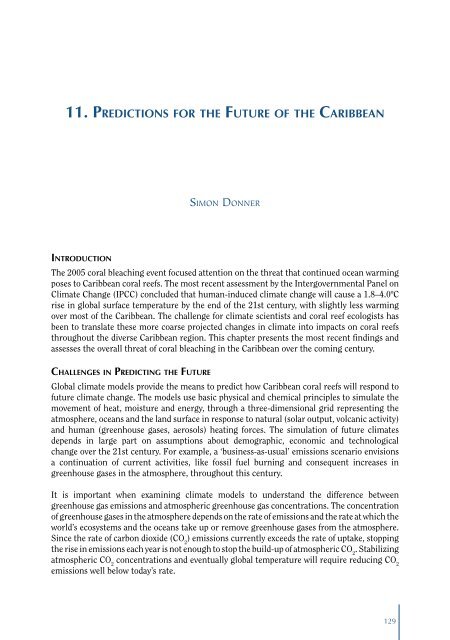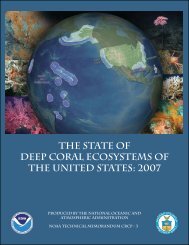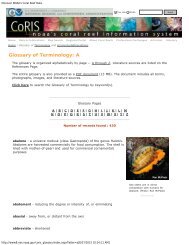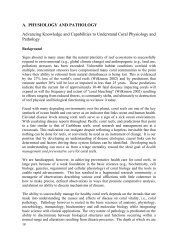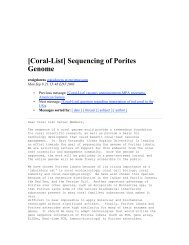Status of Caribbean coral reefs after bleaching and hurricanes in 2005
Status of Caribbean coral reefs after bleaching and hurricanes in 2005
Status of Caribbean coral reefs after bleaching and hurricanes in 2005
You also want an ePaper? Increase the reach of your titles
YUMPU automatically turns print PDFs into web optimized ePapers that Google loves.
11. Pr e d i c t i o n s f o r t h e Fu t u r e o f t h e Ca r i b b e a nSim o n Do n n e rIn t r o d u c t i o nThe <strong>2005</strong> <strong>coral</strong> <strong>bleach<strong>in</strong>g</strong> event focused attention on the threat that cont<strong>in</strong>ued ocean warm<strong>in</strong>gposes to <strong>Caribbean</strong> <strong>coral</strong> <strong>reefs</strong>. The most recent assessment by the Intergovernmental Panel onClimate Change (IPCC) concluded that human-<strong>in</strong>duced climate change will cause a 1.8–4.0ºCrise <strong>in</strong> global surface temperature by the end <strong>of</strong> the 21st century, with slightly less warm<strong>in</strong>gover most <strong>of</strong> the <strong>Caribbean</strong>. The challenge for climate scientists <strong>and</strong> <strong>coral</strong> reef ecologists hasbeen to translate these more coarse projected changes <strong>in</strong> climate <strong>in</strong>to impacts on <strong>coral</strong> <strong>reefs</strong>throughout the diverse <strong>Caribbean</strong> region. This chapter presents the most recent f<strong>in</strong>d<strong>in</strong>gs <strong>and</strong>assesses the overall threat <strong>of</strong> <strong>coral</strong> <strong>bleach<strong>in</strong>g</strong> <strong>in</strong> the <strong>Caribbean</strong> over the com<strong>in</strong>g century.Challenges <strong>in</strong> Pr e d i c t i n g t h e Fu t u r eGlobal climate models provide the means to predict how <strong>Caribbean</strong> <strong>coral</strong> <strong>reefs</strong> will respond t<strong>of</strong>uture climate change. The models use basic physical <strong>and</strong> chemical pr<strong>in</strong>ciples to simulate themovement <strong>of</strong> heat, moisture <strong>and</strong> energy, through a three-dimensional grid represent<strong>in</strong>g theatmosphere, oceans <strong>and</strong> the l<strong>and</strong> surface <strong>in</strong> response to natural (solar output, volcanic activity)<strong>and</strong> human (greenhouse gases, aerosols) heat<strong>in</strong>g forces. The simulation <strong>of</strong> future climatesdepends <strong>in</strong> large part on assumptions about demographic, economic <strong>and</strong> technologicalchange over the 21st century. For example, a ‘bus<strong>in</strong>ess-as-usual’ emissions scenario envisionsa cont<strong>in</strong>uation <strong>of</strong> current activities, like fossil fuel burn<strong>in</strong>g <strong>and</strong> consequent <strong>in</strong>creases <strong>in</strong>greenhouse gases <strong>in</strong> the atmosphere, throughout this century.It is important when exam<strong>in</strong><strong>in</strong>g climate models to underst<strong>and</strong> the difference betweengreenhouse gas emissions <strong>and</strong> atmospheric greenhouse gas concentrations. The concentration<strong>of</strong> greenhouse gases <strong>in</strong> the atmosphere depends on the rate <strong>of</strong> emissions <strong>and</strong> the rate at which theworld’s ecosystems <strong>and</strong> the oceans take up or remove greenhouse gases from the atmosphere.S<strong>in</strong>ce the rate <strong>of</strong> carbon dioxide (CO 2) emissions currently exceeds the rate <strong>of</strong> uptake, stopp<strong>in</strong>gthe rise <strong>in</strong> emissions each year is not enough to stop the build-up <strong>of</strong> atmospheric CO 2. Stabiliz<strong>in</strong>gatmospheric CO 2concentrations <strong>and</strong> eventually global temperature will require reduc<strong>in</strong>g CO 2emissions well below today’s rate.129


